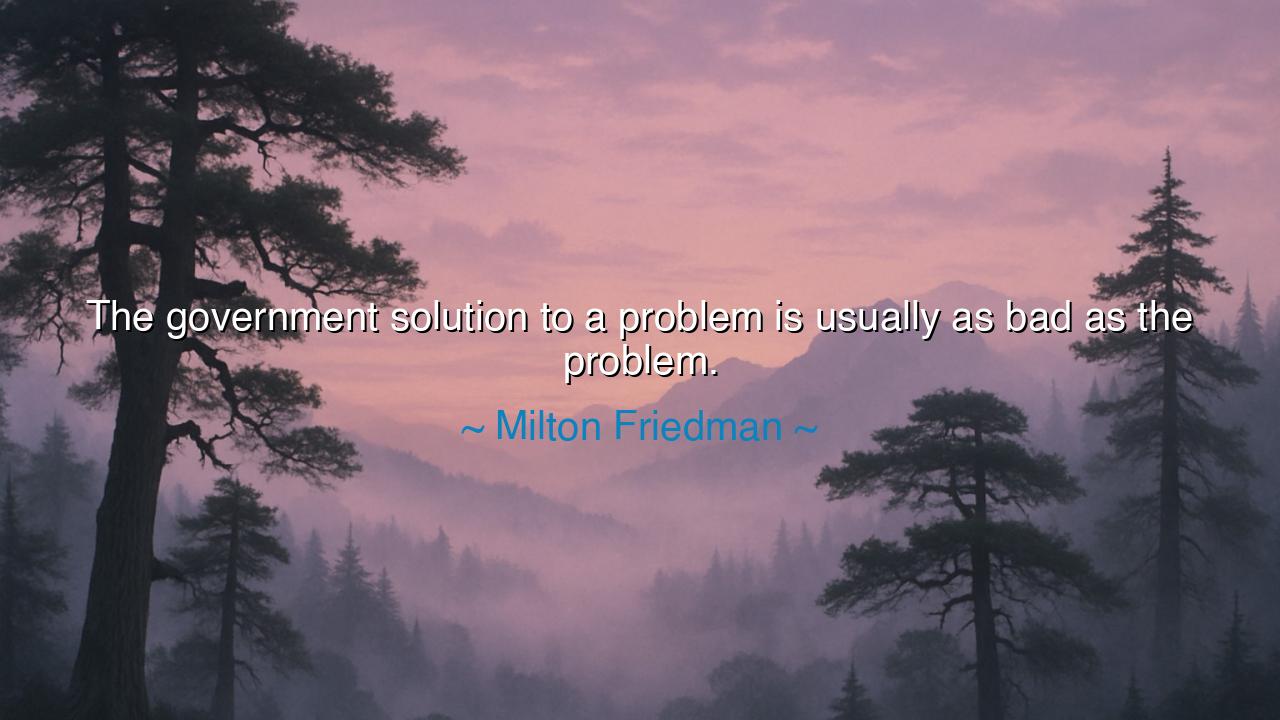
The government solution to a problem is usually as bad as the






“The government solution to a problem is usually as bad as the problem.” — So declared Milton Friedman, the wise economist of the twentieth century, whose words burn like a lantern in the long corridors of power. In this simple sentence lies an eternal warning: that power cannot cure what wisdom must heal, and that when the state reaches too eagerly to mend the wounds of society, it often deepens them instead. The path to ruin, Friedman teaches, is not paved only with malice — but with good intentions ungoverned by humility.
In these words, Friedman does not cry out against government itself, but against the illusion of omnipotence. For every government believes, at first, that it acts for the good — that with the right decree, the right tax, the right reform, it can perfect what nature and freedom have left untamed. Yet the machinery of government is vast, clumsy, and slow, and its reach—though powerful—is often blind. It crushes where it meant to heal, binds where it sought to protect, and suffocates the very spirit it was built to serve.
Friedman spoke from the bitter lessons of the modern age, when government interventions, meant to rescue nations, often chained them to dependency and stagnation. During the Great Depression, well-intentioned laws were passed to stabilize prices and protect workers. Yet these laws, by freezing wages and restricting production, deepened the very misery they sought to ease. The cure became another sickness — a truth as old as history itself, for even the greatest powers cannot command prosperity by decree.
Consider the story of Prohibition in the United States, a tale of virtue turned to folly. The lawmakers, moved by moral zeal, sought to cure the nation of drunkenness by banning all alcohol. They imagined peace and health would flourish; instead, crime multiplied, corruption spread like rot through the halls of justice, and the streets ran with the blood of gangs who feasted upon the forbidden trade. When the law was finally repealed, the nation learned a hard truth: that the coercive hand of government can never purify the human heart. The “solution” had proved more destructive than the vice it condemned.
Friedman’s wisdom flows from this eternal pattern — that freedom, though imperfect, corrects itself, while coercion multiplies its own errors. The people, left free to learn, adapt, and fail, eventually discover balance through experience and reason. But when government interferes, it arrests this natural process; it dulls responsibility and breeds dependence. The nation becomes like a body that, fearing pain, refuses to move — until at last it withers in its own comfort. The problem of government, Friedman reminds us, is not that it acts, but that it acts without limit.
Yet his words are not a call to anarchy, but to wisdom and restraint. Government has its sacred purpose — to protect life, liberty, and property, to guard the weak from the strong, to uphold the peace without which freedom cannot flourish. But beyond that sacred boundary lies danger. For when rulers take upon themselves the task of solving every ill, they forget that virtue cannot be legislated, and that compassion without freedom becomes tyranny in disguise.
Let every generation, then, remember this teaching: beware of those who promise salvation through power. The wise citizen does not beg the state to fix every sorrow, but looks first to himself, his family, his community. The greatest strength of a nation is not found in its decrees, but in the character of its people — in their industry, their courage, their willingness to act without compulsion. When the people are strong, government may be small; when the people are weak, even the mightiest government will fail them.
So take this lesson to heart, children of liberty. Do not look to rulers for what you can build with your own hands. Let your faith rest not in bureaucrats and policies, but in the enduring power of human responsibility and freedom. For as Friedman warns, the state’s solution may soothe for a moment, but it often leaves behind a deeper wound. The true cure lies not in the hand that governs, but in the soul that governs itself.






AAdministratorAdministrator
Welcome, honored guests. Please leave a comment, we will respond soon